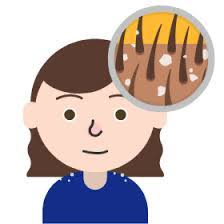Dandruff is a condition that results in flaking of the scalp's skin. It causes itchiness and flakiness without any redness or swelling. This condition is quite common, affecting one in every two individuals. There are four main types of dandruff:
Dry skin dandruff.
Oil-related dandruff.
Disease-related dandruff.
Fungal dandruff.
Seborrheic dermatitis, which leads to irritated and oily skin, is a more severe form of dandruff. Dandruff symptoms tend to worsen in cold and dry winter weather, and factors like stress and fatigue can also trigger it.
Common Symptoms of Dandruff:
Itchy scalp.
Crusty, scaly scalp, often seen as cradle cap in infants.
Skin flakes appearing on the scalp, hair, eyebrows, moustache, beard, or shoulders.
Risk Factors:
Certain factors increase the likelihood of dandruff, including:
Age
Neurological disorders like Parkinson's disease
Being male
Causes of Dandruff:
Infrequent shampooing
Dry skin
Sensitivity to hair care products
Oily, irritated skin
Malassezia, a yeast-like fungus that feeds on scalp oils
Eczema or psoriasis
Hormonal issues
Seborrheic dermatitis
Dandruff vs. Dry Scalp:
People often confuse dandruff with a dry scalp since both cause flaking. However, dandruff results from excessive oil production on the scalp, while a dry scalp occurs when the skin becomes irritated and flakes due to a lack of moisture.
Preventive Measures:
Shampoo frequently (twice a week for women and 3-4 times for men).
Gently massage your scalp while shampooing to loosen flakes.
Include sufficient B vitamins and zinc in your diet.
Minimize the use of harsh chemicals on your scalp.
Try home remedies for dandruff.
Brush your hair regularly.
Use shampoo correctly - Apply the right amount and avoid being too harsh on your scalp.
Tips to Manage Dandruff:
Wash your hair more often.
Improve your diet by reducing high-carb foods.
Oil your hair regularly. Dr Weiser suggests "applying oils to the scalp to help draw out excess oil and remove it".
Switch to an anti-dandruff shampoo.
Avoid scratching your scalp.
Use home remedies like green tea, apple cider vinegar, and neem leaves.
In most cases, dandruff does not require specialized medical treatment. However, if over-the-counter dandruff shampoos fail to improve your condition, consult a dermatologist.
Lifestyle Changes to Prevent Dandruff:
Reduce unhealthy fats in your diet - avoid pastries, cookies, pizza, and packaged snacks.
Eat foods rich in vitamin B, such as fish, chicken, and dark leafy vegetables.
Avoid going out with wet hair.
Prevent sweat buildup on your scalp by maintaining good hygiene.
|

